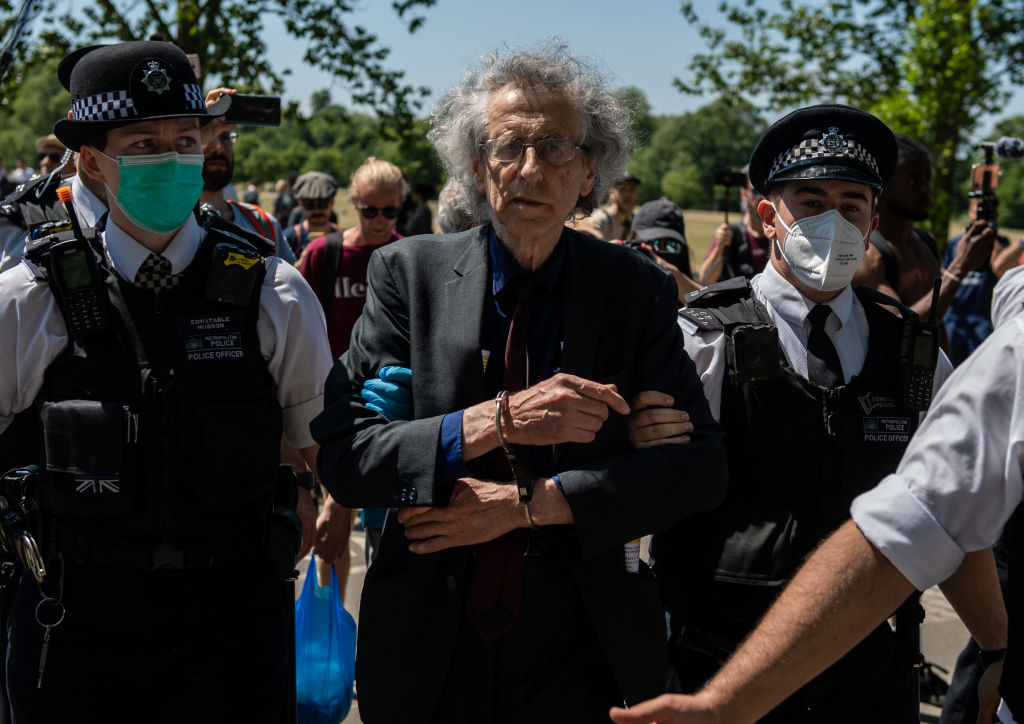If you were looking for the archetype of a crank it would be Piers Corbyn. Rather like his long-forgotten younger brother, he has an unfortunate habit of consorting with people who hold very unpleasant views. So it was no surprise that the anti-lockdown demonstration he organised last Saturday was attended by a motley crowd, with enough misfits and weirdos to satisfy the most exacting Downing Street recruitment process. Among the attendees was David Icke, who believes the Royal Family are shape-shifting lizards and the Rothschilds are responsible for spreading coronavirus.
They are not particularly easy people to like. But the £10,000 fixed penalty notice (FPN) handed out to Mr Corbyn by the Metropolitan Police for organising the demonstration is no less disturbing because he’s a crank with some nasty friends.
At the same time in a nearby part of London, another set of cranks were demonstrating. In fact, Extinction Rebellion protests have continued largely unabated this week. One of their leaders, the insufferable University of East Anglia philosopher Rupert Read, was arrested for criminal damage (allegedly for pouring fake blood over the steps of 55 Tufton Street, the address of a number of think-tanks), an offence for which he is unlikely to be fined more than a few hundred pounds but about which he will no doubt make a great fuss. None of the Extinction Rebellion protestors appears to have yet been hit with a £10,000 FPN.
Mr Corbyn’s alleged offence was to ‘be involved in a relevant gathering’ a remarkably widely drawn offence which – with certain exceptions – is aimed at those ‘involved’ in any outdoor gatherings of more than 30 people.
The exceptions include gatherings arranged by a ‘political body’ (whether that covers the ad hoc alliance of lockdown sceptics of which Mr Corbyn is a part is unclear), but only if they have ‘taken all reasonable measures to limit the risk of transmission of the coronavirus’, something that is unlikely given that the main purpose of the demonstration was to protest against the necessity of taking any such measures.
One does not have to be a fan of Mr Corbyn to shudder at this unreasonable law
Home Office guidance issued early last week implied that the £10,000 FPNs would be reserved for those ‘facilitating or organising’ such illegal gatherings.
As usual, the official guidance was misleading. The regulations themselves – which were published using an emergency procedure avoiding even the cursory Parliamentary scrutiny given to earlier coronavirus regulations – have a far wider scope.
Anyone ‘involved’ in a ‘relevant gathering’ is liable to the £10,000 penalty. This goes far beyond simply ‘organisers and facilitators.’
‘Involvement’ is not defined by the regulations, except to make clear that:
a person is not involved in the holding of a gathering if that person’s only involvement in the gathering is by attendance at the gathering.
The strong implication is that if a person does something more than passively attend a gathering, he is to be regarded as ‘being involved’ in its holding. This, for example, would catch a person who publicises it (perhaps by posting a tweet or a link on Facebook). Even chanting slogans or carrying a banner goes beyond mere ‘attendance’. In practice virtually anyone attending a ‘relevant gathering’, or encouraging others to attend, will be liable for a £10,000 penalty.
You might say ‘hang on, a £10,000 fixed penalty is a bit steep anyway, isn’t it?’
You would be right. Fixed penalty notices have their place in criminal law, and are used for parking fines, minor incidences of antisocial behaviour, deterring dog fouling and the like. In most cases the amount charged is small, typically between £60 and £200. Under the existing coronavirus regulations it was possible, on a sixth breach of the regulations, to become subject to a £3,200 FPN, but until March this year the highest Fixed Penalty permitted by law for any offence was £500 – for running a noisy licensed premises. Introducing a FPN twenty times greater than any previously allowed by law, without consultation or debate, using an emergency procedure of very dubious necessity, is an extraordinary misuse of ministerial power.
Unfortunately, it gets worse. £10,000 is a huge sum of money for most people. Surely to impose such a huge penalty – far more than the vast majority of court-imposed fines – the regulations would require at the very least the authority of a senior police officer?
Not a bit of it. The FPN can be issued by any police constable, and even by a newly qualified Police Community Support Officer (PCSO). This alone is extraordinary. PCSOs are normally responsible for things like seizing tobacco off children or issuing fixed penalties for dropping litter. Giving them the power to hand out £10,000 penalties to political demonstrators is jaw-dropping.
It is true that nobody has to pay the £10,000. Mr Corbyn can take his chance in the Magistrates Court, although the scope of the offence is so wide that it is not obvious what his defence could be. The regulations allow for an unlimited fine and presumably the Magistrates would take the £10,000 as a guide. A trip to the Magistrates is likely to prove even more expensive, especially once legal costs are taken into consideration.
Even if it was not the intention of the government to introduce a decree targeting the lockdown demonstration specifically, it certainly appears that way.
One does not have to be a fan of Mr Corbyn or Mr Icke to shudder at a law that gives such vast powers to the most junior officials; that was introduced by an emergency procedure with no consultation or debate, and after the publication of grossly misleading official guidance as to its intended effect. Unsurprisingly, it appears to have been applied arbitrarily. This is the sort of law-making that might be considered reasonable in Belarus. It has no place in a functioning democracy.
An earlier version of this article incorrectly said Dr Vernon Coleman had attended an anti-lockdown demonstration.







Comments